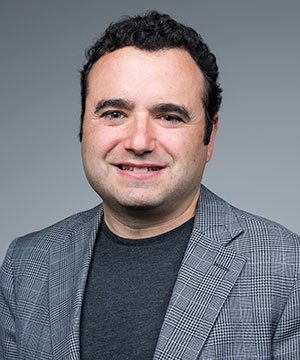
Daniel Reichman
Professor of Anthropology
PhD, Cornell University, 2006
- Office Location
- 439 Lattimore Hall
- Telephone
- (585) 275-8737
Office Hours: on leave Fall 2025
Research Overview
My work focuses on the relationship between culture and economy in Latin America. I use ethnography to understand how economies--past and present--are shaped by shifting systems of meaning and value.
My latest book, Progress in the Balance: Mythologies of Development in Santos, Brazil (2023) argues that models of economic development should be treated like myths, with characters, plots, and dramatic structures that shape how nations connect their past, present, and future into coherent stories. The book uses a historical ethnography of the port city of Santos, Brazil, the center of the global coffee trade, to explore the shifting position of coffee (and agriculture in general) in Brazil’s ideology of progress.
Coffee farm Garça, SP. Brazil 2013
Progress in the Balance is a continuation of a long-term interest in Latin American coffee economies. Whereas that book explores coffee from the top of the pyramid, so to speak, my first book focuses on the bottom of the pyramid—the lives of small-scale coffee producers in Honduras. The Broken Village: Coffee, Migration, and Globalization in Honduras (2011) tells the story of a Honduran village which transformed from a sleepy coffee-growing community to a hotbed of migration to the United States. The book explores how the new “migration economy” transformed cultural ideas of success and failure, family dynamics, economic life, and local politics. This was the first ethnography of Honduran migration to the United States, and it has been widely used as a textbook in undergraduate anthropology and sociology classes. It was awarded third place for the 2012 Victor Turner Prize in Ethnographic Writing.
When I began working on Honduran migration, it was an issue of minor importance to U.S. policy, with very low levels of immigration compared to neighboring Central America countries like El Salvador and Guatemala. Since then, Honduras has become as important country-of-origin for immigrants to the United States, and my work has become increasingly relevant to public policy. I have published pieces on Honduran immigration in Politico and USA Today, and I have spoken about the causes and consequences of Honduran migration to groups at the United Nations, the Interamerican Development Bank, and, on two occasions, the White House Office of Management and Budget.
I was chair of the anthropology department from 2015 to 2021, and, with my colleague Robert Foster, I directed the Lewis Henry Morgan Lectures, the longest running lecture series in North American anthropology. During our directorship, we added seven new books to the Morgan series, which is published by Duke University Press.
My current research project is a book called Globalization’s Glue. The book explores how the invention of glued southern plywood transformed the world—focusing on the linkages between materials science, rural Honduran forests, the lumber industry, and the rise of suburbia in the United States.
Research Interests
- Globalization and trade
- Migration and transnationalism
- Food, development, and environment
- Coffee industry
- Latin America
- Honduras, Brazil
Selected Publications
Book
- 2023 Progress in the Balance: Mythologies of Development in Santos, Brazil. Cornell University Press.
- 2011 The Broken Village: Coffee, Migration and Globalization in Honduras. Industrial and Labor Relations Series. Cornell University Press.
Journal Articles and Book Chapters
- 2022 Putting Climate-induced Migration in Context: The Case of Honduran Migration to the USA Regional Environmental Change. 22.91-101
- 2018. Big Coffee in Brazil: Historical Origins and Implications for Anthropological Political Economy. Journal of Latin American and Caribbean Anthropology.
- 2014. Information and Democracy in the Global Coffee Trade. In. Food Activism: Agency, Democracy, and Economy. Carole Counihan and Valeria Siniscalchi, eds. Bloomsbury.
- 2016. From the Social Production of the Person to Transnational Capitalism: Parsons, Turner, and Globalization. Tipití: Journal of the Society for the Anthropology of Lowland South America: 14:2, Article 154-163.
- 2013. Entrepreneurship in a Pickle: Innovation and Arbitrage in the Sea Cucumber Trade. Anthropological Quarterly. 86:2. 559-588.
- 2011. Migration and Paraethnography in Honduras. American Ethnologist. 38:3.548-558.
- 2008. Justice at a Price: Regulation and Alienation in the Global Economy PoLAR: Political and Legal Anthropology Review 31:1.134-149.
Other Publications
- 2021. “Biden’s immigration plan is a good step, but it demands scrutiny” USA Today, February 21, 2021
- 2016. "Is Brazil the Albany of South America?" Op-ed. NY Daily News. April 20.
- “To Be a Man Here, You Have to Go to the United States.” Politico Magazine. August 18, 2014.
- 2013. Honduras: The Perils of Remittance Dependence and Clandestine Migration. Migration Information Source (online journal of the Migration Policy Institute). Special Issue: Regional Migration Perspectives: Trends, Patterns, and Policies in Central America, Mexico, and the U.S.
- 2008. Coffee as Global Metaphor. Invited Paper for The Center for Latin American and Iberian Studies, Vanderbilt University - Occasional Paper Series (No. 9) February 2008.
- 2006. United Nations Human Development Report for Honduras. Contributed to Chapter on Migration and Social Citizenship
Teaching
Representative list of courses taught:
- ANT 224 Anthropology of Development
- ANT 239 Latin American Immigration
- ANT 202 Modern Social Theory
- ANT 101 Cultural Anthropology
Honors
- 2016 Fulbright Scholar (Federal University of São Carlos, Brazil)
- 2013 Worldwide Universities Network Researcher Mobility Grant
- 2012 Victor Turner Prize for Ethnographic Writing, 3rd Prize
- 2008 University of Rochester, Kauffman Foundation Center for Entrepreneurship Grant
- 2002 National Science Foundation Graduate Research Fellowship
- 2001 US Department of Education FLAS Fellowship (Portuguese)

